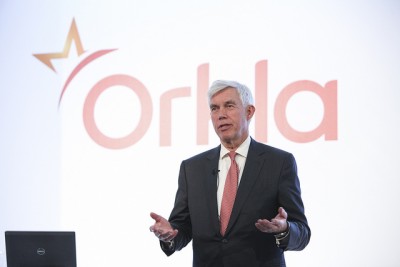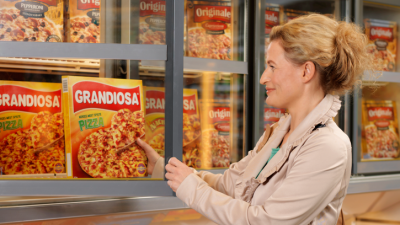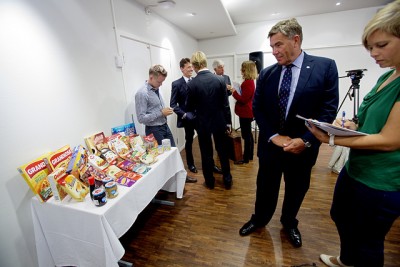Norway’s largest food producer, Orkla, has threatened to move production out of Norway if the new government eases the protectionist policies that keep food prices high. The threat has been met with anger and ridicule from economists and discount grocery store chain Bunnpris, while the minister in charge of agriculture and food responded that government policy won’t be formed by threats.

“It’s liberating to see the management of Orkla come out the closet,” researcher Ivar Gaasland at the Institute for Economics at the University of Bergen told newspaper Dagens Næringsliv (DN). “They’re asking for (continued) protection for a loss-generating industry that they’re a part of.”
Orkla, led by men otherwise known as arch-capitalists such as its chairman Stein Erik Hagen and chief executive Åge Korsvold, has suddenly emerged as a champion of the Norwegian farmers from whom it buys much of its raw materials processed into such products as Pizza Grandiosa, Stabbur canned mackerel, Idun ketchup and Nora jams and jellies. Orkla is Norway’s largest food producer with a wide range of brands, not least after it took over Bergen-based Rieber & Søn and officially formed Orkla Foods Norway in a merger with Rieber and Stabburet last month. The company, which has been in the midst of extensive restructuring and middle-management upheaval, now has 23 production facilities around the country, but won’t say which of them might be shut down if Orkla moves production overseas.

Top Orkla officials were among those attending a recent series of meetings between food industry players and new Agriculture and Food Minister Sylvi Listhaug, where they revealed their attempts to lobby against any major changes in Norway’s protectionist food policies. On Wednesday, Orkla’s chief executive Korsvold wrote a commentary in DN in which he blasted an earlier commentary by Professor Victor Norman of business school NHH in Bergen that supported the government’s efforts to liberalize Norway’s tightly controlled markets and lower food prices.
Korsvold clearly resented Norman’s “implication” that Orkla “lives a protected life behind high import tariffs” and that Orkla benefits from higher cheese tariffs. That’s wrong, argued Korsvold, claiming instead Orkla does indeed face “hard competition” and that food imports to Norway have more than doubled since 1995. He claimed, though, that around 100,000 jobs in farming and food processing are at stake, mostly in Norway’s outlying areas, if the government cuts subsidies and tariffs that help keep cheaper imports out of the market. Norwegian agriculture will always be expensive because of Norway’s topography and climate, Korsvold argued, and if Orkla and other food producers lose the protective regulatory framework they’ve had for years, Orkla will be forced to adjust, “either in the form of importing more raw ingredients itself or moving production abroad.”

Rubbish, responds Christian Lykke of Trondheim, who owns the Bunnpris chain of more than 200 discount grocery stores. Lykke, who welcomes the promised revamp of Norwegian agriculture and food polices, urged Orkla to go ahead and move if they can’t tolerate competition in a more open market.
Lykke, like Professor Victor Norman and many politicians in the new conservative government, is highly critical of the entrenched interests represented by the farmers’ meat and dairy cooperatives Nortura (Gilde and Prior) and Tine, which he believes have far too much power to control production and set prices in Norway. He also thinks Norwegian agriculture needs to be far more specialized, farming what grows well in Norway and dropping efforts to raise other products that are of much poorer quality than those that can be imported yet much more expensive for consumers. Norman, meanwhile, had claimed that Norway’s protectionism doesn’t just protect farmers but all the coops and companies like Tine, Nortura, Orkla, Synnøve Finden, Rema and NorgesGruppen (the latter two other grocery store chains that produce some of their own food items).

Gaasland of the University of Bergen told DN that Orkla must realize they aren’t competitive against other international food producers and are using the farmers to promote their own interests. Gaasland called Orkla’s arguments “a textbook example of how those who lose in free trade resort to lobbying.” DN, meanwhile, reported that every Pizza Grandiosa that Orkla sells gets the equivalent of NOK 3 in state support.
Many view it as ironic that Orkla Chairman Stein Erik Hagen, known for earlier quarrels with the Labour Party that’s now in opposition and his support otherwise for tax cuts and market liberalization urged by the new Conservatives-led government, is now behind pleas for ongoing market regulation and subsidies. Hagen denied, though, that Orkla won’t manage without subsidies for the farmers, and said the company competes against international producers in other areas that aren’t protected by import tariffs. That doesn’t explain why most bottles of shampoo or cleaning products are also far more expensive in Norway than in other countries, although the power of Norway’s wholesalers plays a role.
Agriculture Minister Listhaug, meanwhile, claimed she won’t be swayed by threats. “They won’t steer the politics we’re carrying out,” Listhaug told DN. She was open to a proposal from Korsvold that her ministry set up a panel of experts to find ways to simplify Norwegian food production and make it more efficient, even though the government has conducted numerous such studies before. Listhaug also stressed that much of her work ahead towards lowering food prices and increasing selection will be carried out within the ministry.
newsinenglish.no/Nina Berglund

